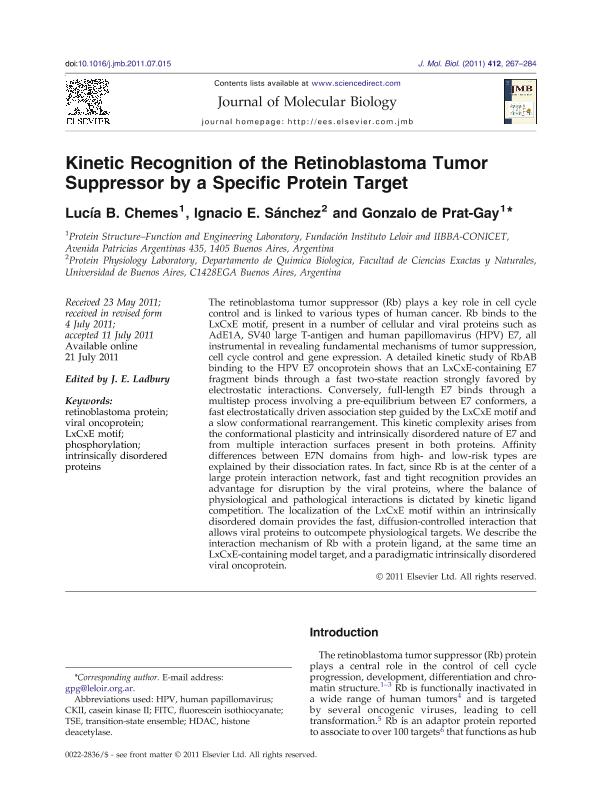Mostrar el registro sencillo del ítem
dc.contributor.author
Chemes, Lucia Beatriz

dc.contributor.author
Sánchez Miguel, Ignacio Enrique

dc.contributor.author
de Prat Gay, Gonzalo

dc.date.available
2017-04-12T14:36:41Z
dc.date.issued
2011-09
dc.identifier.citation
Chemes, Lucia Beatriz; Sánchez Miguel, Ignacio Enrique; de Prat Gay, Gonzalo; Kinetic recognition of the retinoblastoma tumor suppressor by a specific protein target; Elsevier; Journal Of Molecular Biology; 412; 2; 9-2011; 267-284
dc.identifier.uri
http://hdl.handle.net/11336/15205
dc.description.abstract
The retinoblastoma tumor suppressor (Rb) plays a key role in cell cycle control and is linked to various types of human cancer. Rb binds to the LxCxE motif, present in a number of cellular and viral proteins such as AdE1A, SV40 large T-antigen and human papillomavirus (HPV) E7, all instrumental in revealing fundamental mechanisms of tumor suppression, cell cycle control and gene expression. A detailed kinetic study of RbAB binding to the HPV E7 oncoprotein shows that an LxCxE-containing E7 fragment binds through a fast two-state reaction strongly favored by electrostatic interactions. Conversely, full-length E7 binds through a multistep process involving a pre-equilibrium between E7 conformers, a fast electrostatically driven association step guided by the LxCxE motif and a slow conformational rearrangement. This kinetic complexity arises from the conformational plasticity and intrinsically disordered nature of E7 and from multiple interaction surfaces present in both proteins. Affinity differences between E7N domains from high- and low-risk types are explained by their dissociation rates. In fact, since Rb is at the center of a large protein interaction network, fast and tight recognition provides an advantage for disruption by the viral proteins, where the balance of physiological and pathological interactions is dictated by kinetic ligand competition. The localization of the LxCxE motif within an intrinsically disordered domain provides the fast, diffusion-controlled interaction that allows viral proteins to outcompete physiological targets. We describe the interaction mechanism of Rb with a protein ligand, at the same time an LxCxE-containing model target, and a paradigmatic intrinsically disordered viral oncoprotein.
dc.format
application/pdf
dc.language.iso
eng
dc.publisher
Elsevier

dc.rights
info:eu-repo/semantics/openAccess
dc.rights.uri
https://creativecommons.org/licenses/by-nc-sa/2.5/ar/
dc.subject
Papillomavirus
dc.subject
Retinoblastoma
dc.subject
Kinetics
dc.subject
E7 Oncoprotein
dc.subject.classification
Virología

dc.subject.classification
Ciencias Biológicas

dc.subject.classification
CIENCIAS NATURALES Y EXACTAS

dc.title
Kinetic recognition of the retinoblastoma tumor suppressor by a specific protein target
dc.type
info:eu-repo/semantics/article
dc.type
info:ar-repo/semantics/artículo
dc.type
info:eu-repo/semantics/publishedVersion
dc.date.updated
2017-03-29T14:45:39Z
dc.identifier.eissn
1089-8638
dc.journal.volume
412
dc.journal.number
2
dc.journal.pagination
267-284
dc.journal.pais
Países Bajos

dc.journal.ciudad
Amsterdam
dc.description.fil
Fil: Chemes, Lucia Beatriz. Consejo Nacional de Investigaciones Científicas y Técnicas. Oficina de Coordinación Administrativa Parque Centenario. Instituto de Investigaciones Bioquimicas de Buenos Aires; Argentina. Fundación Instituto Leloir; Argentina
dc.description.fil
Fil: Sánchez Miguel, Ignacio Enrique. Consejo Nacional de Investigaciones Científicas y Técnicas; Argentina. Universidad de Buenos Aires. Facultad de Ciencias Exactas y Naturales; Argentina
dc.description.fil
Fil: de Prat Gay, Gonzalo. Consejo Nacional de Investigaciones Científicas y Técnicas. Oficina de Coordinación Administrativa Parque Centenario. Instituto de Investigaciones Bioquimicas de Buenos Aires; Argentina. Fundación Instituto Leloir; Argentina
dc.journal.title
Journal Of Molecular Biology

dc.relation.alternativeid
info:eu-repo/semantics/altIdentifier/url/http://www.sciencedirect.com/science/article/pii/S0022283611007698
dc.relation.alternativeid
info:eu-repo/semantics/altIdentifier/doi/http://dx.doi.org/10.1016/j.jmb.2011.07.015
Archivos asociados
